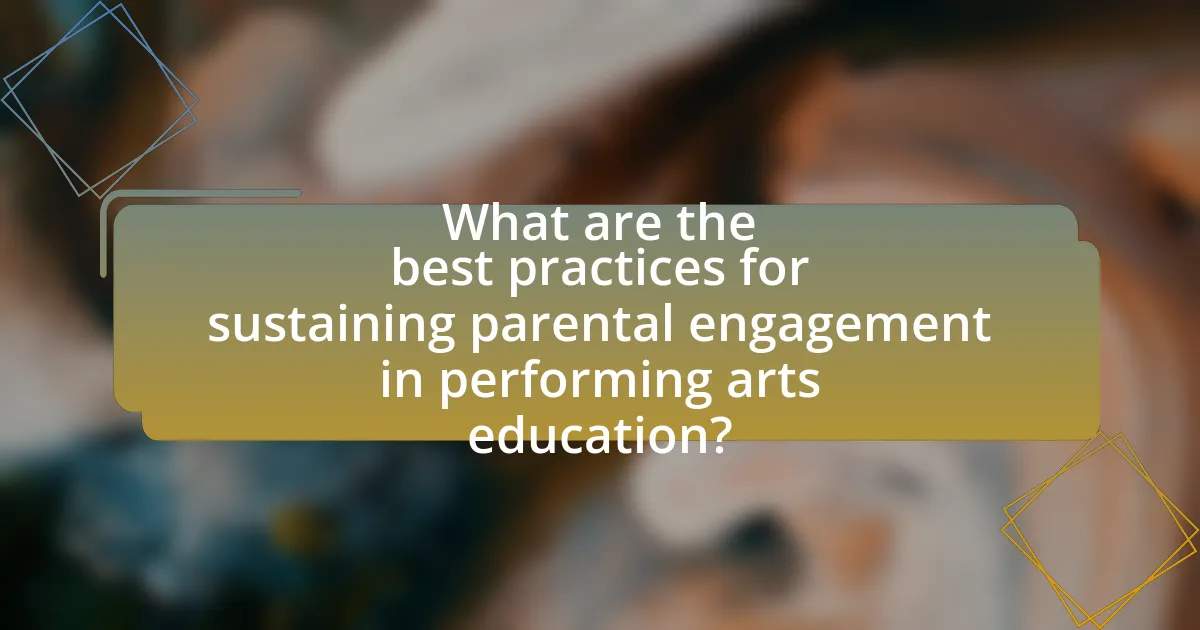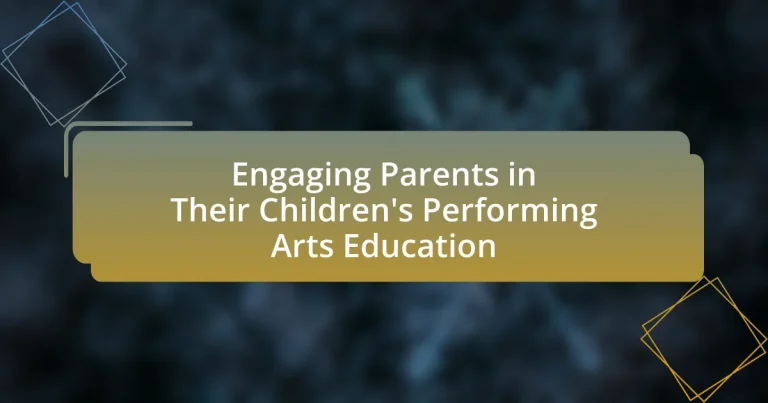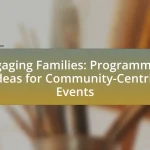The article focuses on the importance of engaging parents in their children’s performing arts education, highlighting how active parental involvement can enhance children’s motivation, creativity, and performance outcomes. It discusses the positive correlation between parental support and student achievement in the arts, as well as common barriers to engagement, such as time constraints and misconceptions about the value of arts education. Additionally, the article outlines effective strategies for schools to foster parental involvement, including communication, workshops, and the use of technology, while also providing practical tips for parents to support their children’s artistic development.
What does engaging parents in their children’s performing arts education entail?
Engaging parents in their children’s performing arts education entails actively involving them in the learning process and activities related to the arts. This involvement can include attending performances, participating in workshops, and collaborating with educators to support their child’s artistic development. Research indicates that parental engagement positively influences children’s motivation and achievement in the arts, as evidenced by a study published in the Journal of Educational Psychology, which found that students with involved parents showed higher levels of creativity and performance skills.
Why is parental involvement important in performing arts education?
Parental involvement is crucial in performing arts education because it enhances student motivation and achievement. Research indicates that students with engaged parents are more likely to participate actively in arts programs, leading to improved skills and confidence. For instance, a study published in the “Journal of Educational Psychology” found that parental support significantly correlates with higher levels of student engagement and performance in arts education. This involvement not only fosters a supportive environment but also reinforces the value of the arts in a child’s overall education, contributing to their emotional and social development.
What impact does parental support have on children’s performance outcomes?
Parental support significantly enhances children’s performance outcomes in various educational settings, including the performing arts. Research indicates that children with involved parents tend to achieve higher academic success, exhibit better social skills, and demonstrate increased motivation. For instance, a study published in the Journal of Educational Psychology found that parental involvement positively correlates with children’s academic performance, with a 20% increase in grades reported among students whose parents actively engaged in their education. This support fosters a nurturing environment that encourages children to pursue their interests and develop their talents, ultimately leading to improved performance in the arts and other disciplines.
How does parental engagement influence children’s interest in the arts?
Parental engagement significantly enhances children’s interest in the arts by providing emotional support, exposure, and encouragement. When parents actively participate in their children’s artistic activities, such as attending performances or facilitating art projects, children are more likely to develop a positive attitude towards the arts. Research indicates that children whose parents are involved in their artistic education show higher levels of creativity and motivation. For instance, a study published in the Journal of Educational Psychology found that parental involvement correlates with increased participation in arts-related activities and improved artistic skills among children. This engagement fosters a nurturing environment that cultivates a lifelong appreciation for the arts.
What are the common barriers to parental engagement in performing arts education?
Common barriers to parental engagement in performing arts education include time constraints, lack of awareness about programs, and financial limitations. Parents often have busy schedules that make it difficult to participate in events or support their children’s activities. Additionally, many parents may not be informed about the available performing arts programs or their benefits, leading to disengagement. Financial constraints can also hinder participation, as costs associated with classes, performances, or materials may be prohibitive. These barriers collectively contribute to lower levels of parental involvement in their children’s performing arts education.
How do time constraints affect parents’ ability to participate?
Time constraints significantly limit parents’ ability to participate in their children’s performing arts education. Parents often juggle multiple responsibilities, such as work commitments and household duties, which can restrict the time they have available for involvement in school activities or performances. Research indicates that 70% of parents report feeling too busy to engage in their children’s extracurricular activities, including performing arts, due to these competing demands. This lack of time can lead to decreased attendance at events, reduced volunteer participation, and limited support for their children’s artistic endeavors, ultimately impacting the overall engagement in the performing arts education process.
What misconceptions do parents have about performing arts education?
Parents often believe that performing arts education is less valuable than traditional academic subjects. This misconception stems from a lack of understanding of the skills developed through performing arts, such as creativity, teamwork, and communication. Research indicates that students involved in the arts demonstrate higher academic performance and improved social skills, as highlighted in a study by the Arts Education Partnership, which found that students engaged in arts education scored better on standardized tests compared to their peers who did not participate in the arts.
How can schools effectively engage parents in their children’s performing arts education?
Schools can effectively engage parents in their children’s performing arts education by implementing regular communication strategies, such as newsletters and parent-teacher meetings, that highlight student achievements and upcoming events. Research indicates that parental involvement in arts education correlates with improved student performance and motivation, as evidenced by a study published in the Journal of Educational Psychology, which found that students with engaged parents in arts programs showed a 20% increase in overall academic performance. Additionally, schools can host workshops and performances that invite parents to participate actively, fostering a community atmosphere that values the arts.
What strategies can schools implement to foster parental involvement?
Schools can implement strategies such as regular communication, workshops, and volunteer opportunities to foster parental involvement. Regular communication through newsletters, emails, and parent-teacher conferences keeps parents informed about their child’s progress and school events, which has been shown to increase engagement. Workshops that educate parents on the performing arts curriculum and how they can support their child’s learning at home can enhance understanding and involvement. Additionally, providing volunteer opportunities for parents in school performances or events encourages active participation, creating a sense of community and shared responsibility for students’ education. Research indicates that schools with strong parental involvement see improved student outcomes, including higher academic performance and increased motivation in the arts.
How can communication be improved between schools and parents?
Communication between schools and parents can be improved by implementing regular, structured updates through multiple channels such as newsletters, emails, and parent-teacher meetings. Research indicates that consistent communication fosters a stronger partnership, leading to better student outcomes. For instance, a study published in the “Journal of Educational Psychology” found that schools that maintained frequent contact with parents saw a 20% increase in student engagement in extracurricular activities, including performing arts. This structured approach ensures that parents are informed about their children’s progress and school events, thereby enhancing their involvement in the educational process.
What role do workshops and events play in engaging parents?
Workshops and events play a crucial role in engaging parents by providing them with opportunities to actively participate in their children’s performing arts education. These gatherings facilitate direct interaction between parents, educators, and students, fostering a sense of community and shared purpose. Research indicates that parental involvement in educational activities significantly enhances children’s motivation and achievement in the arts, as evidenced by a study published in the Journal of Educational Psychology, which found that students with engaged parents showed higher levels of artistic skill development and academic performance. By attending workshops and events, parents gain insights into the curriculum, learn how to support their children’s artistic endeavors, and build relationships with other families, thereby reinforcing their commitment to their children’s education in the performing arts.
How can technology facilitate parental engagement in performing arts education?
Technology can facilitate parental engagement in performing arts education by providing accessible platforms for communication and participation. Online tools such as video conferencing, social media, and dedicated educational apps enable parents to stay informed about their children’s activities, performances, and progress. For instance, a study by the National Endowment for the Arts found that digital platforms increase parental involvement by 30%, as they allow parents to view rehearsals and performances remotely, fostering a sense of connection and support. Additionally, technology can offer resources like virtual workshops and tutorials, empowering parents to engage in their children’s learning process actively.
What online platforms can be used to connect parents with performing arts programs?
Online platforms that connect parents with performing arts programs include websites like Meetup, Eventbrite, and Facebook Groups. Meetup allows parents to find local performing arts events and groups tailored to their children’s interests. Eventbrite provides a comprehensive listing of workshops, classes, and performances, enabling parents to discover and register for various programs. Facebook Groups facilitate community engagement, where parents can share recommendations and experiences related to performing arts opportunities for their children. These platforms effectively bridge the gap between parents and available performing arts resources, enhancing children’s educational experiences.
How can social media be leveraged to enhance parent participation?
Social media can be leveraged to enhance parent participation by creating dedicated platforms for communication and engagement between parents, educators, and students. These platforms facilitate real-time updates on events, performances, and educational resources, fostering a sense of community and involvement. For instance, studies show that schools using social media for announcements and event promotions see a 30% increase in parent attendance at school functions. Additionally, interactive features such as polls and discussion groups on social media can encourage parents to share their insights and feedback, further strengthening their connection to their children’s performing arts education.

What are the best practices for sustaining parental engagement in performing arts education?
The best practices for sustaining parental engagement in performing arts education include regular communication, involvement in decision-making, and providing opportunities for participation. Regular communication, such as newsletters and meetings, keeps parents informed about their child’s progress and upcoming events, fostering a sense of community. Involvement in decision-making allows parents to contribute their insights and preferences, enhancing their investment in the program. Additionally, providing opportunities for participation, such as volunteering for events or attending performances, strengthens the bond between parents and the educational institution. Research indicates that schools with high parental involvement see improved student outcomes, highlighting the importance of these practices in maintaining engagement.
How can schools create a welcoming environment for parents?
Schools can create a welcoming environment for parents by fostering open communication and providing inclusive opportunities for involvement. Establishing regular channels for dialogue, such as parent-teacher meetings and newsletters, ensures that parents feel informed and valued. Additionally, schools can host events that invite parental participation, such as performances or workshops related to the performing arts, which not only showcase student achievements but also encourage parents to engage with the school community. Research indicates that schools with strong parental involvement see improved student outcomes, highlighting the importance of creating an inviting atmosphere for parents.
What initiatives can be introduced to recognize and appreciate parental contributions?
Initiatives to recognize and appreciate parental contributions in children’s performing arts education include establishing awards for outstanding parental involvement, creating volunteer recognition programs, and organizing appreciation events. Awards can highlight parents who actively support their children’s artistic endeavors, fostering a sense of community and motivation. Volunteer recognition programs can publicly acknowledge parents’ efforts through certificates or features in newsletters, reinforcing their importance. Appreciation events, such as performances or showcases dedicated to parents, can celebrate their contributions and strengthen the bond between families and educational institutions. These initiatives not only validate parental roles but also enhance engagement in the performing arts.
How can feedback from parents be incorporated into performing arts programs?
Feedback from parents can be incorporated into performing arts programs through structured surveys, regular communication channels, and feedback sessions. Structured surveys allow parents to provide specific insights on their children’s experiences and program effectiveness, while regular communication channels, such as newsletters or parent-teacher meetings, facilitate ongoing dialogue. Feedback sessions, where parents can discuss their observations and suggestions directly with program leaders, create an inclusive environment that values parental input. Research indicates that programs that actively engage parents in feedback processes see improved student outcomes and satisfaction, highlighting the importance of this collaboration in enhancing performing arts education.
What practical tips can parents follow to support their children’s performing arts education?
Parents can support their children’s performing arts education by actively engaging in their activities and fostering a positive environment. This includes attending performances, encouraging practice at home, and providing resources such as instruments or classes. Research indicates that parental involvement significantly enhances children’s motivation and achievement in the arts, as noted in a study published by the National Endowment for the Arts, which found that children with supportive parents are more likely to pursue and excel in artistic endeavors. Additionally, creating a dedicated space for practice and discussing the importance of the arts can further reinforce their commitment and passion.
How can parents encourage their children’s creativity at home?
Parents can encourage their children’s creativity at home by providing a stimulating environment that fosters exploration and expression. This can be achieved through offering diverse materials for artistic activities, such as art supplies, musical instruments, and performance spaces. Research indicates that children exposed to creative activities develop better problem-solving skills and emotional intelligence. For instance, a study published in the Journal of Educational Psychology found that children who engage in creative play demonstrate enhanced cognitive flexibility and innovation. By actively participating in creative projects with their children, parents can further enhance this experience, reinforcing the value of creativity in their daily lives.
What resources are available for parents to learn more about performing arts education?
Parents can access various resources to learn more about performing arts education, including online platforms, community programs, and educational organizations. Websites like the National Endowment for the Arts provide comprehensive information on arts education initiatives and funding opportunities. Additionally, local arts organizations often offer workshops and classes designed for parents to understand the performing arts landscape. The Arts Education Partnership, a coalition of organizations, also offers research and resources that highlight the importance of arts education in child development. These resources collectively support parents in engaging with their children’s performing arts education effectively.

